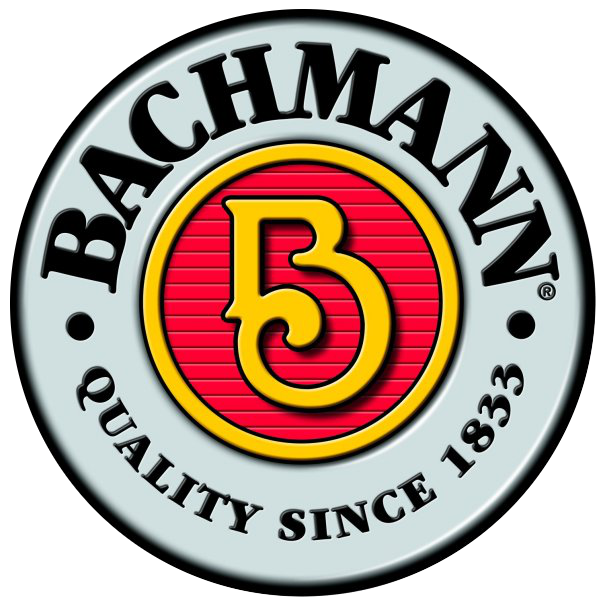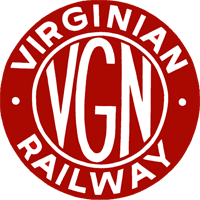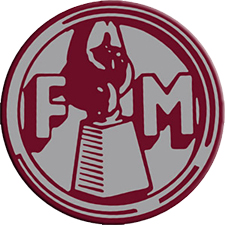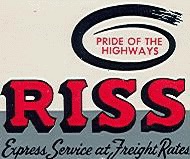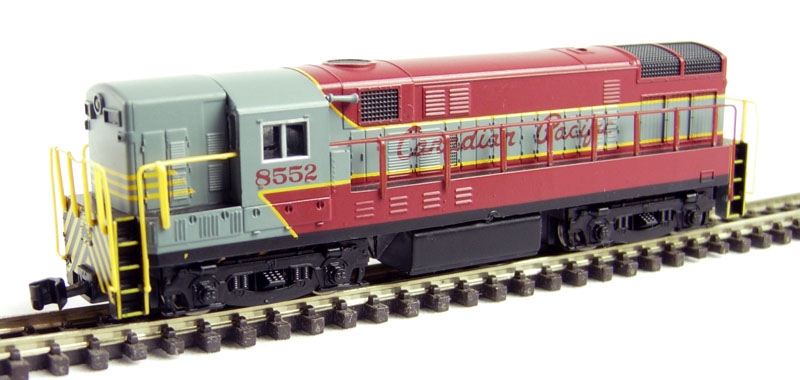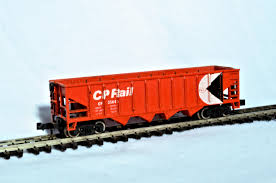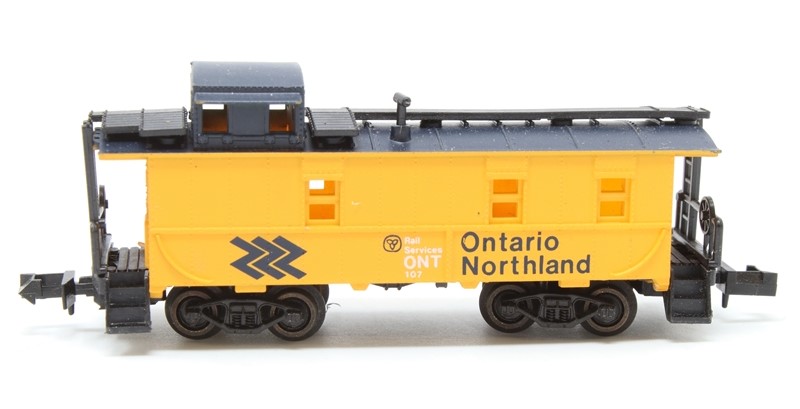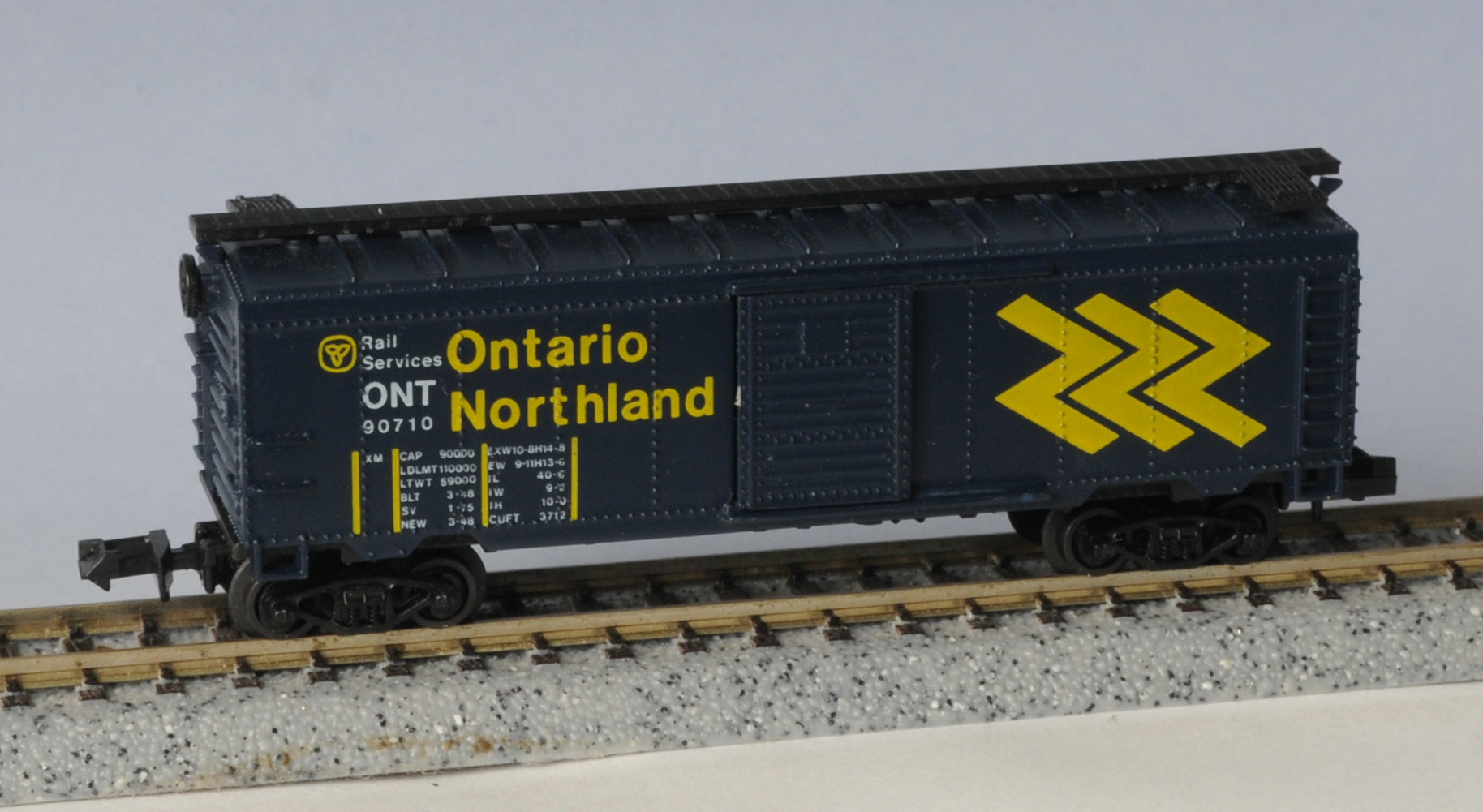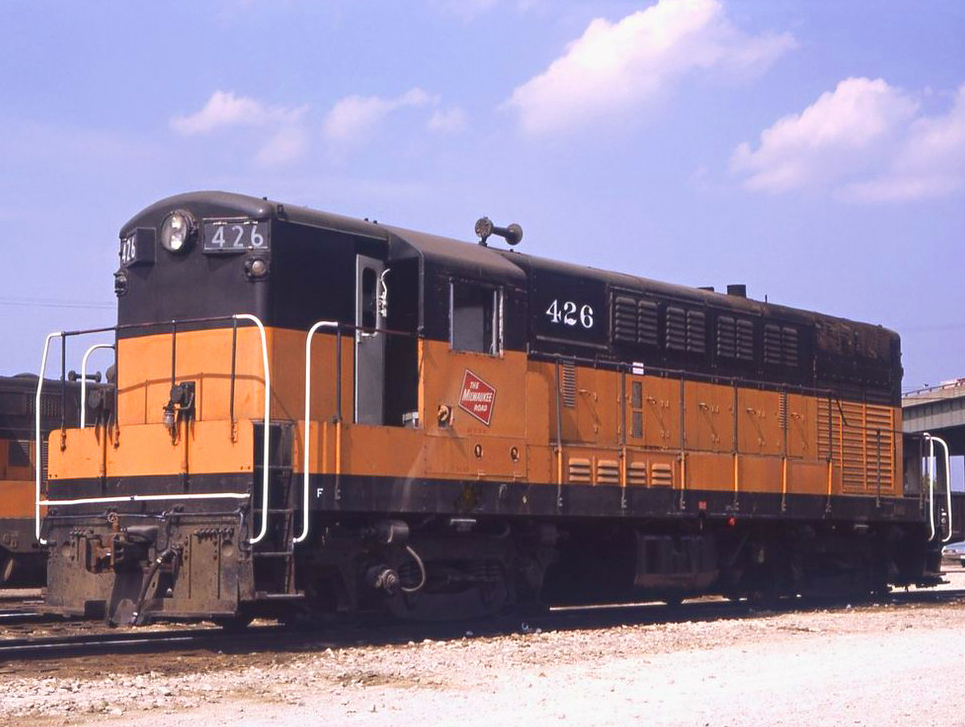Model Information: Features:
- All metal chassis, with split-frame.
- Fuel tank is painted onto the chassis.
- Closed-sided 3-poler motor, without flywheels.
- All wheels provide pickup (no traction tires) and are geared.
- Directional lighting (LEDs).
- Dummy knuckle couplers, body-mounted.
- Blackened and low-profile wheels .
- All metal chassis, with split-frame.
- Fuel tank is painted onto the chassis.
- Closed-sided 3-poler motor, without flywheels.
- All wheels provide pickup (no traction tires) and are geared.
- Directional lighting (LEDs).
- Dummy knuckle couplers, body-mounted.
- Blackened and low-profile wheels .
DCC Information: There is no stock drop-in decoder option, but these models feature a removable weight where a decoder can be placed, as well as having solder-ready contacts on the lightboard for DCC wiring.
So not a DCC-Ready model, but DCC-Friendly certainly with our classification.
An example of installation of a wired decoder in this model can be found on Brad Myers' N scale DCC Decoder Installs website.
So not a DCC-Ready model, but DCC-Friendly certainly with our classification.
An example of installation of a wired decoder in this model can be found on Brad Myers' N scale DCC Decoder Installs website.
Prototype History: The FM H-16-44 was a road switcher produced by Fairbanks-Morse from April 1950 – February 1963. The locomotive shared an identical platform and carbody with the predecessor Model FM H-15-44 (but not the FM H-20-44 end cab road switcher which used a different carbody and frame and a larger prime mover), and were equipped with the same eight-cylinder opposed piston engine that had been uprated to 1,600 horsepower (1,200 kW). The H-16-44 was configured in a B-B wheel arrangement, mounted atop a pair of two-axle AAR Type-B road trucks with all axles powered. In late 1950, the AAR trucks were almost exclusively replaced with the same units found on the company's "C-liner" locomotives.
The FM H-16-44 would prove the builder's most successful road-switcher of the five Fairbanks-Morse ultimately cataloged. Not only did this particularly locomotive see strong sales but the company also found a variety of buyers including foreign lines in Mexico as well as orders through its subsidiary, the Canadian Locomotive Company. 209 were built for American railroads, 58 were manufactured from March 1955 – June 1957 by the Canadian Locomotive Company for use in Canada, and 32 units were exported to Mexico.
From Wikipedia
Read more on American-Rails.com
Full F-M H-16-44 data sheet on The Diesel Shop.
The FM H-16-44 would prove the builder's most successful road-switcher of the five Fairbanks-Morse ultimately cataloged. Not only did this particularly locomotive see strong sales but the company also found a variety of buyers including foreign lines in Mexico as well as orders through its subsidiary, the Canadian Locomotive Company. 209 were built for American railroads, 58 were manufactured from March 1955 – June 1957 by the Canadian Locomotive Company for use in Canada, and 32 units were exported to Mexico.
From Wikipedia
Read more on American-Rails.com
Full F-M H-16-44 data sheet on The Diesel Shop.
Road Name History: The Virginian Railway (VGN) was conceived early in the 20th century by two men. One was a brilliant civil engineer, coal mining manager, and entrepreneur, William Nelson Page. His partner was millionaire industrialist, Henry Huttleston Rogers. Together, they built a well-engineered railroad that was virtually a "conveyor belt on rails" to transport high quality "smokeless" bituminous coal from southern West Virginia to port on Hampton Roads, near Norfolk, Virginia.
The Virginian Railway Company was formed in Virginia on March 8, 1907 to combine the Deepwater Railway in West Virginia and the Tidewater Railway in Virginia into a single interstate railroad, only a few months after Victoria was incorporated. On April 15, 1907, William Nelson Page became the first president of the new Virginian Railway.
Throughout that profitable 50-year history, the VGN continued to follow the Page-Rogers policy of "paying up front for the best." It became particularly well known for treating its employees and vendors well, another investment that paid rich dividends. The VGN sought (and achieved) best efficiencies in the mountains, rolling piedmont and flat tidewater terrain. The profitable VGN experimented with the finest and largest steam, electric, and diesel locomotives. It was well known for operating the largest and best equipment, and could afford to. It became nicknamed "the richest little railroad in the world."
Norfolk & Western Railway and Virginian Railway merged in 1959.
The Virginian Railway Company was formed in Virginia on March 8, 1907 to combine the Deepwater Railway in West Virginia and the Tidewater Railway in Virginia into a single interstate railroad, only a few months after Victoria was incorporated. On April 15, 1907, William Nelson Page became the first president of the new Virginian Railway.
Throughout that profitable 50-year history, the VGN continued to follow the Page-Rogers policy of "paying up front for the best." It became particularly well known for treating its employees and vendors well, another investment that paid rich dividends. The VGN sought (and achieved) best efficiencies in the mountains, rolling piedmont and flat tidewater terrain. The profitable VGN experimented with the finest and largest steam, electric, and diesel locomotives. It was well known for operating the largest and best equipment, and could afford to. It became nicknamed "the richest little railroad in the world."
Norfolk & Western Railway and Virginian Railway merged in 1959.
Brand/Importer Information: Bachmann Industries (Bachmann Brothers, Inc.) is a Bermuda registered Chinese owned company, globally headquartered in Hong Kong; specializing in model railroading.
Founded in Philadelphia, Pennsylvania, the home of its North American headquarters, Bachmann is today part of the Kader group, who model products are made at a Chinese Government joint-venture plant in Dongguan, China. Bachmann's brand is the largest seller, in terms of volume, of model trains in the world. Bachmann primarily specializes in entry level train sets, and premium offerings in many scales. The Spectrum line is the high quality, model railroad product line, offered in N, HO, Large Scale, On30, and Williams O gauge all aimed for the hobbyist market. Bachmann is the producer of the famous railroad village product line known as "Plasticville." The turnover for Bachmann model trains for the year ended 31 December 2006 was approximately $46.87 million, a slight increase of 3.36% as compared to 2005.
Founded in Philadelphia, Pennsylvania, the home of its North American headquarters, Bachmann is today part of the Kader group, who model products are made at a Chinese Government joint-venture plant in Dongguan, China. Bachmann's brand is the largest seller, in terms of volume, of model trains in the world. Bachmann primarily specializes in entry level train sets, and premium offerings in many scales. The Spectrum line is the high quality, model railroad product line, offered in N, HO, Large Scale, On30, and Williams O gauge all aimed for the hobbyist market. Bachmann is the producer of the famous railroad village product line known as "Plasticville." The turnover for Bachmann model trains for the year ended 31 December 2006 was approximately $46.87 million, a slight increase of 3.36% as compared to 2005.
Item created by: Alain LM on 2018-08-17 05:58:18. Last edited by CNW400 on 2020-06-30 09:11:09
If you see errors or missing data in this entry, please feel free to log in and edit it. Anyone with a Gmail account can log in instantly.
If you see errors or missing data in this entry, please feel free to log in and edit it. Anyone with a Gmail account can log in instantly.



